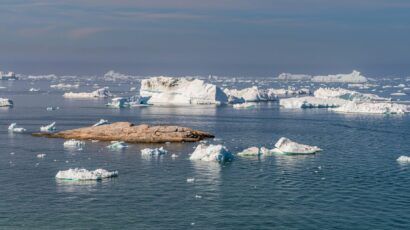A changed relationship with nature
By Pablo Solón |
Multilateral negotiations toward reduced carbon emissions are not getting the job done. According to the UN Environment Programme's Emissions Gap Report 2012, global carbon dioxide emissions amounted to 49 gigatons in 2010. If global warming is to be limited to 2 degrees Celsius—still a disruptive increase—emissions must be reduced to about 44 gigatons by the year 2020. What are nations doing to achieve this goal? Many are making nonbinding emissions pledges, often expressed in ranges from the less ambitious to the more ambitious. The UN Environment Programme reckons that if nations meet only their less ambitious pledges, while subjecting themselves to lenient accounting rules, global emissions in 2020 will amount to about 57 gigatons of carbon. This is only one gigaton less than would result from a business-as-usual approach. That is, all the effort expended toward the Copenhagen, Cancún, Durban, and Doha climate conferences would decrease carbon emissions by less than 2 percent compared with business as usual. Even if nations meet their more ambitious targets and subject themselves to strict accounting rules, emissions would still decrease by just six gigatons from business-as-usual projections.
So what should UN-sponsored negotiations actually strive to accomplish? First, an emissions target for 2020 should be clearly defined: 44 gigatons of carbon dioxide is a reasonable goal, though a much lower amount would be preferable. That number, divided by projected global population in 2020—about 7.7 billion—works out to around 5.7 metric tons of carbon dioxide emissions per capita.
The next step would be to establish per capita emissions targets for each country. These should be calculated on the basis of the principles that underlie the UN Framework Convention on Climate Change—equity, and common but differentiated responsibilities. Nations with more responsibility for the carbon already added to the atmosphere would have to do more to cut emissions. Those with less historical responsibility would be allowed more space for economic development. And because many developed countries can outsource their emissions, national per capita targets must take into account consumption as well as emissions. If a European nation, for example, imports manufactured goods from a developing country, it makes no sense for the emissions generated in the manufacturing process to be counted entirely against the developing country.
All countries must adopt their target per capita emissions as binding commitments. There should be no "pledge-and-review system"—a system that, instead of demanding negotiated emissions limits, allows voluntary pledges. No country can be exempt from emissions limits, no matter how rich or how poor. In the short term, some nations would cut emissions more, and some would cut emissions less. Some would even be allowed to increase their emissions for a period of time, but it must be clear when they would begin to reduce emissions, and by how much.
In order to guarantee that binding commitments are indeed binding, a climate justice tribunal with sanctioning power must be established. The principle of common but differentiated responsibility should apply to compliance just as it should to emissions themselves: Nations that have added the most carbon to the atmosphere in the past should suffer the heaviest consequences if they fail to meet their commitments, while those with the least historical responsibility should suffer very light sanctions.
No state should be able to wriggle out of its binding commitments through offsets and carbon-market mechanisms. Initiatives like reducing emissions associated with deforestation and forest degradation in other countries, or promoting "climate-smart agriculture" and "blue carbon" projects are problematic not only because they create permits to pollute but also because "carbon credits" are financial derivatives that could contribute to a speculative financial crisis.
Additionally, climate agreements should guarantee that at least two-thirds of the world's proven fossil fuel reserves remain underground. This is in line with the International Energy Agency's view that no more than one-third of proven reserves can safely be consumed before 2050.
Finally, the right to development—which the United Nations recognizes in its Declaration on the Right to Development—should not be understood as the right to pollute as much as others have polluted in the past. In most countries, where poverty results from the concentration of wealth in very few hands, eliminating poverty does not even require development. The main task in addressing poverty is redistributing wealth at the national, regional, and global levels. The right to development should be understood as the right to attend to people's fundamental needs, not the right to pursue a development model that doesn't take into account Earth's limits.
Ending endless growth. Climate negotiations make slow progress not because climate science is unconvincing or public awareness is lacking. Rather, elites and multinational corporations have captured the negotiations. Though diplomats from many countries understand that emissions of greenhouse gases remain too high because of consumerism and the pursuit of economic growth, few are willing to discuss changes to the economic system that drives climate change.
If climate change is to be meaningfully addressed, the world must abandon the paradigm of endless growth that is the basis of the capitalist system. Nations must abandon their insane competition with one another and instead promote solidarity among peoples. Economies that aim to grow beyond the limits that nature allows will sooner or later collapse, and democratic systems cannot survive if societies do not adopt different relationships to nature. Governments that treat nature as an object will exploit their people as well, treating them merely as consumers or sources of capital.
The climate crisis cannot be solved through technological patches such as biofuels, nuclear energy, genetically modified crops, carbon capture and storage, or geoengineering. These dangerous approaches only undermine nature's cycles even further. Indeed, to address climate change and the other pressing issues that face the world, human beings must embrace certain attitudes to life that predate capitalism—as expressed, for example, in the ethos of vivir bien (living well). According to this set of principles, associated with indigenous peoples of Latin America, humans are an integral part of nature; people and nature are not two separate identities. The main goal of vivir bien is seeking balance, rather than growing at the expense of others or of nature. "Living well" means living in harmony with nature and with other people, complementing instead of competing. What does vivir bien indicate about climate change? That human beings, to face this challenge, must recover their humanity and fundamentally change their relationship with nature.
This essay was updated on October 17, 2013, to correct an editorial error.















